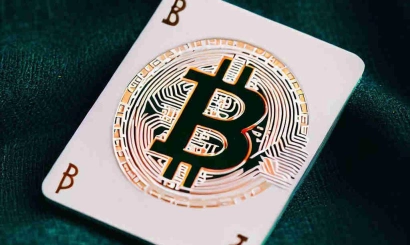Adoption Stage: How BlackRock's CEO Embraced Bitcoin
In managing ETFs, BlackRock has accumulated over 200,000 bitcoins. Larry Fink's attitude towards Bitcoin has completely changed over the years. Here's how BlackRock led the institutional market for cryptocurrency
As far back as 2017, Larry Fink, the CEO of the world's largest asset management company, BlackRock, referred to Bitcoin as a "money laundering index" and asserted that his clients did not want to buy cryptocurrency. Now, however, he claims to have great faith in Bitcoin. His company has launched a rapidly growing Bitcoin fund and established partnerships with leading players in the digital asset industry.
In January, the U.S. Securities and Exchange Commission (SEC) approved the launch of spot exchange-traded funds (ETFs) from a group of companies, with BlackRock being the largest among them. In the very first month of trading, its iShares Bitcoin Trust fund emerged as a leader both in trading volumes and in the amount of assets under management. The demand from American spot ETFs is considered one of the main catalysts for Bitcoin's growth at the beginning of 2024.
The fact that Fink has drastically changed his attitude towards cryptocurrency lends Bitcoin a certain legitimacy in the financial markets in the U.S., where its legal status remains unclear. By trading Bitcoin in the form of BlackRock's fund shares, regulated entities can now legally invest in it without having to directly engage with cryptocurrency itself. North America accounts for approximately a quarter of all crypto asset transactions, with the U.S. market being more reliant on institutional activity than other regions.
Bitcoin's asset stability has also played a role. Throughout the history of the crypto market, after each major crash, a new boom has begun, attracting more investors each time. In early March, the price of Bitcoin surpassed its previous record, soaring above $70,000. Back in late 2022, when the major crypto exchange FTX collapsed, Bitcoin was trading below $16,000.
Following the market recovery after the 2022 crash, BlackRock set its sights on creating an ETF for the leading cryptocurrency, sources familiar with the company's affairs told The Wall Street Journal. Its analysts spent several years studying the crypto industry from within to develop a strategy for dealing with digital assets.
Critics of BlackRock's approach argue that the company is taking on reputational risk by offering clients such volatile assets. Another argument is their selfish interest in earning fund fees rather than Bitcoin itself. BlackRock earns an average of 0.19% on transactions with assets in its Bitcoin ETF. The company launched the fund with a discounted fee of 0.12% for the first $5 billion of assets raised or for the first year from the fund's launch. This stage was quickly surpassed: as of March 12, the fund already holds over 200,000 bitcoins (over $14 billion in dollar equivalent). After the first year of operation, the ETF's fee will increase to 0.25%.
- Market Influence
BlackRock's participation in the crypto market has largely contributed to the rise in Bitcoin's value. Among all the spot ETFs on Bitcoin launched in January, its iShares Bitcoin Trust fund consistently leads in net inflows and has amassed over $10 billion in assets faster than others.
Many major investors began allocating funds to Bitcoin precisely in June 2023, when BlackRock entered the race to launch the first spot Bitcoin fund. Throughout its history, the company has launched dozens of ETFs on other assets and almost never faced regulator rejections. Additionally, a legal decision forcing the SEC to reconsider a competitor's spot ETF application played in BlackRock's favor—the veteran of the crypto market, Grayscale. This moment was pivotal in changing the regulator's attitude, which had been rejecting similar fund applications since 2013.
WSJ experts surveyed concur that BlackRock's swift ascent to the top is not surprising. The company possesses an "unparalleled ability to penetrate the market, an unmatched distribution network, and marketing power," says Dennis Kelleher, president of Better Markets, a group advocating for financial sector oversight in the U.S. According to him, all these attributes provide Wall Street investors with a certain "illusory level of comfort."
BlackRock's perspective on cryptocurrencies sharply contrasts with that of its largest competitor, Vanguard. Vanguard, founded by legendary investor Jack Bogle, manages assets worth $8.7 trillion. Vanguard publicly stated that it has no plans to launch a spot ETF on Bitcoin and will not offer cryptocurrency-related products on its own brokerage platform. The company referred to Bitcoin as "more speculation than investment."
- Adoption Timeline
The adoption of Bitcoin at BlackRock was gradual. Apart from its own Bitcoin ETF, BlackRock has established partnerships with some major players in the cryptocurrency market.
During the pandemic, Rick Rieder, the investment director of the company's fixed-income division, began trading Bitcoin futures through his funds. Around the same time, according to sources familiar with journalists' discussions, Robbie Mitchnick, head of BlackRock's digital asset division, began influencing Larry Fink's opinion and contributed to changing his rhetoric regarding cryptocurrency.
Later, this became particularly noticeable. In April 2022, during an earnings call, Fink stated that BlackRock was extensively studying the cryptocurrency sector and observing increased client interest. In the same month, BlackRock participated in a $400 million investment round for Circle, the second-largest stablecoin USDC issuer by market capitalization. BlackRock acquired a stake in Circle and took charge of managing its reserves to support USDC worth over $25 billion.
By the summer of the same year, BlackRock quietly launched a private trust fund worth $250 million, which effectively became its first spot Bitcoin product for American institutional clients. The company created the fund with its own funds and expanded it through external investors. According to WSJ sources familiar with the situation, most clients of this trust fund have already transferred their funds to the new spot ETF.
In the same year, BlackRock partnered with the largest cryptocurrency exchange in the U.S., Coinbase, and opened institutional clients' access to its Aladdin platform for portfolio management and risk analysis. Currently, Coinbase also provides custodian services (i.e., holds bitcoins) for BlackRock's spot Bitcoin ETF.
BlackRock's cryptocurrency ambitions extend beyond Bitcoin. The company has filed an application with the SEC to launch a spot ETF for the second-largest cryptocurrency, Ethereum. The regulator is expected to make decisions on several similar applications as early as May.




_410x245_00e.webp)


